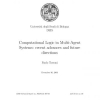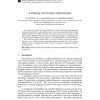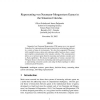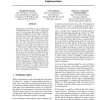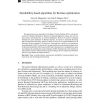AMAI
2004
Springer
13 years 4 months ago
2004
Springer
We present systems of logic programming agents (LPAS) to model the interactions between decision-makers while evolving to a conclusion. Such a system consists of a number of agents...
AMAI
2004
Springer
13 years 4 months ago
2004
Springer
Prototyping is a valuable technique to help software engineers explore the design space while gaining insight on the dynamics of the system. In this paper, we describe a method for...
AMAI
2004
Springer
13 years 4 months ago
2004
Springer
AMAI
2004
Springer
13 years 4 months ago
2004
Springer
AMAI
2004
Springer
13 years 4 months ago
2004
Springer
Sequential von Neumann-Morgernstern (VM) games are a very general formalism for representing multi-agent interactions and planning problems in a variety of types of environments. ...
AMAI
2004
Springer
13 years 4 months ago
2004
Springer
AMAI
2004
Springer
13 years 4 months ago
2004
Springer
AMAI
2004
Springer
13 years 4 months ago
2004
Springer
AMAI
2004
Springer
13 years 4 months ago
2004
Springer
We introduce the notion of combinatorial vote, where a group of agents (or voters) is supposed to express preferences and come to a common decision concerning a set of non-independ...
AMAI
2004
Springer
13 years 4 months ago
2004
Springer
We address the topic of specifying multi-agent systems using the situation and state calculus (SSC). SSC has been proposed as an extension of the situation calculus to overcome so...

